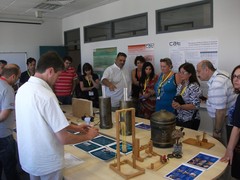EU-UNAWE took part in the first annual international PRI-SCI-NET conference earlier this month, from 3–5 September 2013, in Nicosia, the Cypriot capital. Around 50 primary school teachers and other educators from around the world where invited to the conference to discuss, share experiences and learn best practises for bringing inquiry-based learning in science education to their primary-level students.
Running parallel to the PRI-SCI-NET event was the 10th biannual Conference of the European Science Education Research Association, ESERA 2013, which comprised of a range of discussions focusing on 'Evidence-based Teaching and Coherent Learning', covering different approaches for enhancing our knowledge of learning processes, the role of context and formal vs. non-formal learning.
Like EU-UNAWE, PRI-SCI-NET is an FP7 project for innovative methods in science education, but unlike the 'astronomy for kids' project, PRI-SCI-NET's number one role is to carry out teacher training on inquiry based teaching methods on a large scale in Europe. The project is coordinated by the Malta Council for Science and Technology (MCST) and has 17 partners from 14 countries, including three of the six EU-UNAWE member countries, and many more member states of our international network. The project aims to promote inquiry-based learning approaches among teachers of young children between 3 and 11 years old. The idea is that active engagement in the learning process, where the focus is on investigative research and discovery, promotes student autonomy and self regulated learning, improves social interaction and collaboration, and communication with peers.
During the three day conference, teachers presented examples of the successes and failures of inquiry-based activities held at their schools, discussed the roles of teacher and pupils, and shared advise on how to evaluate students' progress when conducting open-ended investigations.
For information on upcoming PRI-SCI-NET teacher training events. Or to join an international community of primary school with whom you can share experiences, ask for advice or simply network, visit the PRI-SCI-NET website at www.prisci.net.













